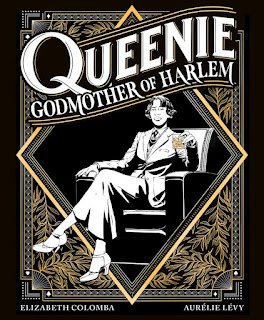I only first learned about Queenie's existence within the past year or so when I read Mikaël's Harlem; however, I believe I had actually gotten a copy of Queenie: Godmother of Harlem already but simply had not read it. I want to say Mikaël's book was submitted for an Eisner Award, and that's why I prioritized reading that but I seem to recall seeing both books around the same time.
In any event, Queenie: Godmother of Harlem by Elizabeth Colomba and Aurélie is a biography of Stephanie St. Clair, who was a New York City mob boss in the 1930s. She stood toe to toe with the likes of Dutch Schultz and Lucky Luciano, and commanded their respect despite being both Black and a woman. Although ostensibly a "bad guy" by virtue of being a mob moss, Queenie was in fact a very strong advocate for the Black community, writing newspaper pieces that pointed out police brutality and corruption (somewhat ironic since she was paying some of them off herself) as well as advocating for voting rights. She helped promote talented Black members of the community and helped lift up the names of the likes of Thelonious Monk and Duke Ellington. She regularly contributed to rent parties and acted as a banker to many Harlem locals who were denied opportunities at more formal institutions.
Colomba and Aurélie do an excellent job of portraying Queenie's entire life. While the book opens in the '30s with her already being well-established, they use a number of flashbacks to give glimpses into her childhood and her rise in Harlem. I think that's one of the great successes of Queenie: Godmother of Harlem over Harlem, which is almost entirely centered around her life as a mob moss with no context of how she go there. The flashbacks in Queenie not only provide that context but are expertly interspersed throughout the story to help connect with her current decisions and actions.
One thing I particularly like about the story is that it essentially has a happy ending. I think the expectation with a story about anyone on the "wrong" side of the law is for things to end with a huge gun battle à la Butch Cassidy and the Sundance Kid but we're able to see Queenie enjoy herself and live a happy, contented life. Granted, since this is a biography, that has lot to do with what Queenie actually did with her life, but Colomba and Aurélie made, I think, a smart choice in actually showing that and letting us spend a little time there.
Probably my biggest criticism of the book was the use of asterisks. (I know that sounds weird; bear with me.) Because it is a narrative biography of a historical figure, there are a number of instances where colloquial language and/or references are used that might not be well known today.
As one might expect, after many of these, an asterisk is included to direct readers to a note somewhat separated from the main story explaining the word or phrase. Conceptually, that's fine and I appreciate the additional information in many cases. But the problem I have here is that sometimes the asterisk directs readers to a note at the bottom of the page, sometimes it directs them to a note at the back of the book, and in one instance, there is an entire extra page couched within the broader narrative that breaks the fourth wall to explain the phrase in detail. As far as I can tell, there's no discernable way to tell which of those three methods is used in any given instance, and more than a couple times, I found myself flipping to the endnotes only to find that the asterisk referred instead to a footnote. And the in-story aside of the one had me totally lost since, even after I stumbled into it, it's the only instance of the fourth wall breaking and seemed very out of place.
The story overall was done very well, and I quite liked learning of Queenie's significance to the Black community at that time. If you still have the impression of 1930s mob bosses as the stereotypical movie gangsters that shot it out with the likes of Eliot Ness,
I'd urge you to pick up Queenie: Godmother of Harlem. It came out early this year from Abrams/Megascope and should be available at all major retailers for $24.99 US.
Queenie, Godmother of Harlem Review
By Sean Kleefeld | Tuesday, July 11, 2023
Leave a Comment







0 comments:
Post a Comment